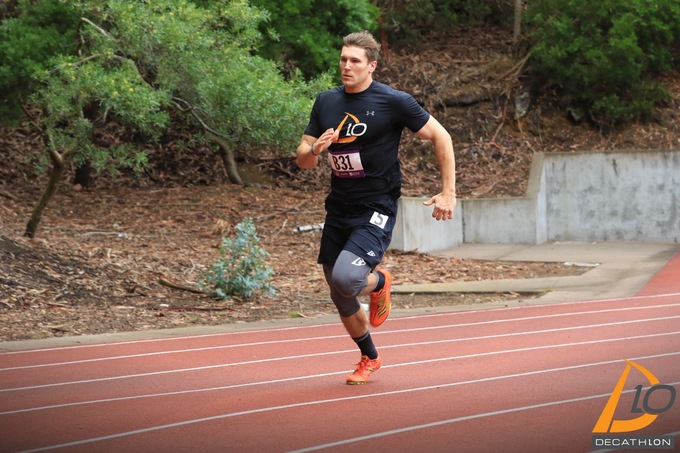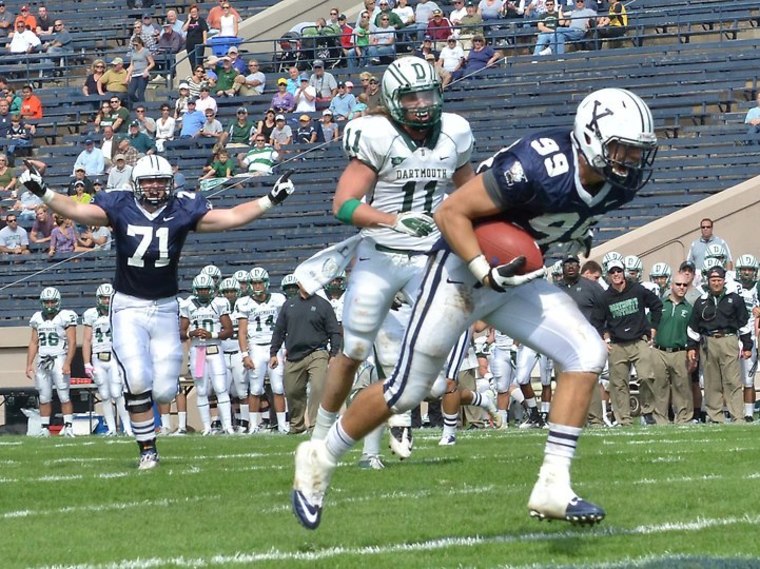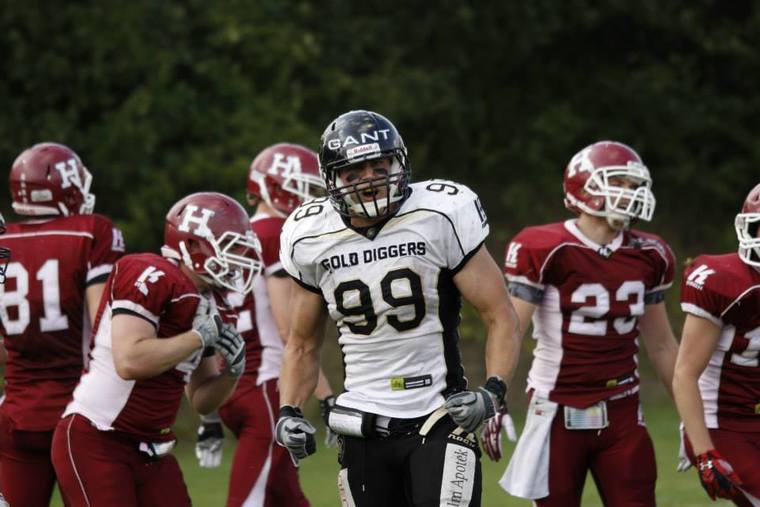Dylan Drake: Doing Things the Right Way
July 21, 2018

Dylan Drake, Program Manager at Google, won the inaugural D10 San Francisco Men's Individual trophy in 2016, while raising over $5000 for Lucile Packard Children's Hospital.
Dylan's athletic career had begun in earnest ten years earlier, at St. Thomas Aquinas High School in Ft. Lauderdale, FL. Coming out of high school, he was recruited as a defensive end and matriculated at Yale University.
"The traditions of Yale football were the main selling point," he recalls now. "I really fell in love with the Yale Bowl. I was enamored by the opportunity to play in a stadium with that kind of pedigree."
After college, Dylan spent a year playing American football professionally in Denmark, as a designated "import player." He played both ways, adding wide receiver to his defensive line duties, and subsequently coached on the Danish national team before settling in the Bay Area.
He spoke with The D10 recently about playing to win, and giving back.
You've been in the Bay Area a couple years now. How do you like it?
I live in Palo Alto - I'm a peninsula guy. I rep the South Bay fairly hard. What I like about it is being able to get to the mountains, the coast, being able to find open gyms, or being able to shoot hoops by myself. I like the space down here.
As a South Florida native, you always have to rep the peninsula, right?
You might be right. I hadn't thought about it like that.
You were set to defend your D10 San Francisco Individual title last October, when wildfires forced the cancellation of the event. Do you feel like that situation gives you something extra to prove this year?
My friends and coworkers who have had to look at the trophy the last two years or who've seen me bring it to parties might be happy to see it change hands. Where I take it is, I still haven't lost it.
Ultimately, the goal of The D10 is to raise money for an important cause. I definitely, at the same time, want to compete at the top end of the competition. That's maybe the politically correct answer.
What's the unfiltered answer?
The desire and the competitiveness is a little overboard, according to my friends. If you want the hot take, I plan on repeating, and I want to win it. It's going to be quite an extraordinary challenge. My expectations for myself are to go all out, put max effort into all the events. But over the past two years, as I've enjoyed getting to know other members of the community, it's become much more balanced. That competitive mentality shifts a little bit.
With any competition, you look at it and say, What do I have to do to win? My first year I took a very technical approach on the running events, working with Coach Granville to be efficient on the 400 and 800, and to maximize my results. The last two years, as I've worked with a sports performance coach named Eddie Winslow, there's been a huge focus on technique, especially for Pull-Ups and the Bench Press, building up the muscles that go into those.

Where does your competitive intensity come from?
I have to give a lot of credit to three men that were instrumental in helping me develop the competitiveness and the work ethic that are required to be successful at the college level. I attended St. Thomas Aquinas High School in Fort Lauderdale, which, at the time, Sports Illustrated had ranked the third best high school athletics program in the country, I believe.
I thought of myself, entering freshman year, as an aspiring athlete. Basketball is what I had mostly played as a youth. But the football program at Aquinas had all the glamor, and I said, This is what I want to do. I want this to be me. My parents had encouraged athletics maybe third, behind family obligations and school. Because of that, my younger brother and I didn't get burned out. We didn't get hurt in our youth. We didn't have that early guidance about what was really needed to be a top athlete. What we got was guidance about doing things the right way.
So I give credit to head coach George Smith. Rob Biasotti is one of the top high school strength and conditioning coaches in the country. And defensive coordinator Rocco Casullo....these men stressed doing the right thing on and off the field. I played mean. I was slightly undersized for a defensive end. I wasn't the ideal body type to play in a three-point stance, and I made up for it with the tenacity with which I played. I would say I compete with some athletic zeal.
But when you're off the field, you have to remember that it's just a game.

What kind of motivation do you draw from The D10's philanthropic mission?
It's not the same thing, but, growing up, I had an unfortunate illness - or, fortunate, I should say, because it turned out fine.
First and second grade, I was in Joe DiMaggio Children's Hospital in Hollywood, Florida, on a weekly basis, getting treatment in the same wing as the pediatric cancer patients. You see the same faces every day - the kids and their parents - and you see how tough they were. That has always stuck with me, and every once in a while, your mind wanders back to it. Tying that back to The D10, I would say there's a lot of motivation there, a lot of motivation in giving these kids the best care, and giving them the opportunity to lead the best possible life.
Dylan's athletic career had begun in earnest ten years earlier, at St. Thomas Aquinas High School in Ft. Lauderdale, FL. Coming out of high school, he was recruited as a defensive end and matriculated at Yale University.
"The traditions of Yale football were the main selling point," he recalls now. "I really fell in love with the Yale Bowl. I was enamored by the opportunity to play in a stadium with that kind of pedigree."
After college, Dylan spent a year playing American football professionally in Denmark, as a designated "import player." He played both ways, adding wide receiver to his defensive line duties, and subsequently coached on the Danish national team before settling in the Bay Area.
He spoke with The D10 recently about playing to win, and giving back.
I live in Palo Alto - I'm a peninsula guy. I rep the South Bay fairly hard. What I like about it is being able to get to the mountains, the coast, being able to find open gyms, or being able to shoot hoops by myself. I like the space down here.
As a South Florida native, you always have to rep the peninsula, right?
You might be right. I hadn't thought about it like that.
You were set to defend your D10 San Francisco Individual title last October, when wildfires forced the cancellation of the event. Do you feel like that situation gives you something extra to prove this year?
My friends and coworkers who have had to look at the trophy the last two years or who've seen me bring it to parties might be happy to see it change hands. Where I take it is, I still haven't lost it.
Ultimately, the goal of The D10 is to raise money for an important cause. I definitely, at the same time, want to compete at the top end of the competition. That's maybe the politically correct answer.
What's the unfiltered answer?
The desire and the competitiveness is a little overboard, according to my friends. If you want the hot take, I plan on repeating, and I want to win it. It's going to be quite an extraordinary challenge. My expectations for myself are to go all out, put max effort into all the events. But over the past two years, as I've enjoyed getting to know other members of the community, it's become much more balanced. That competitive mentality shifts a little bit.
With any competition, you look at it and say, What do I have to do to win? My first year I took a very technical approach on the running events, working with Coach Granville to be efficient on the 400 and 800, and to maximize my results. The last two years, as I've worked with a sports performance coach named Eddie Winslow, there's been a huge focus on technique, especially for Pull-Ups and the Bench Press, building up the muscles that go into those.

Where does your competitive intensity come from?
I have to give a lot of credit to three men that were instrumental in helping me develop the competitiveness and the work ethic that are required to be successful at the college level. I attended St. Thomas Aquinas High School in Fort Lauderdale, which, at the time, Sports Illustrated had ranked the third best high school athletics program in the country, I believe.
I thought of myself, entering freshman year, as an aspiring athlete. Basketball is what I had mostly played as a youth. But the football program at Aquinas had all the glamor, and I said, This is what I want to do. I want this to be me. My parents had encouraged athletics maybe third, behind family obligations and school. Because of that, my younger brother and I didn't get burned out. We didn't get hurt in our youth. We didn't have that early guidance about what was really needed to be a top athlete. What we got was guidance about doing things the right way.
So I give credit to head coach George Smith. Rob Biasotti is one of the top high school strength and conditioning coaches in the country. And defensive coordinator Rocco Casullo....these men stressed doing the right thing on and off the field. I played mean. I was slightly undersized for a defensive end. I wasn't the ideal body type to play in a three-point stance, and I made up for it with the tenacity with which I played. I would say I compete with some athletic zeal.
But when you're off the field, you have to remember that it's just a game.

What kind of motivation do you draw from The D10's philanthropic mission?
It's not the same thing, but, growing up, I had an unfortunate illness - or, fortunate, I should say, because it turned out fine.
First and second grade, I was in Joe DiMaggio Children's Hospital in Hollywood, Florida, on a weekly basis, getting treatment in the same wing as the pediatric cancer patients. You see the same faces every day - the kids and their parents - and you see how tough they were. That has always stuck with me, and every once in a while, your mind wanders back to it. Tying that back to The D10, I would say there's a lot of motivation there, a lot of motivation in giving these kids the best care, and giving them the opportunity to lead the best possible life.
I hate asking people for things. I'm specifically not a banker because I don't think I could ask people for money every day. When it comes to fundraising for The D10, I try to show how genuine my aspirations are. I try to get that in front of people who know me, and see if it trickles down somehow. I love being able to support my friends' and my coworkers' and my peers' causes - financially, and with my time. Hopefully I'm able to draw on some of that and have people come through and contribute.
You mentioned that compared to two years ago, there's a different mentality. There's more balance. What do you attribute that to?
Last year I spent assistant coaching at Palo Alto High School, and this year I'm assistant coaching at Archbishop Mitty in San Jose, which is almost eerily similar to the experience I had at Aquinas.
My high school coaches were working full-time jobs. They would leave work early, so they could be at practice at 4. It's an opportunity for me to give back and help the kids do it a little better than I did. Seeing them achieve success is so gratifying when it comes about by identifying a weakness that you can then turn into a strength.
I know how great that felt as a young adult, and that's why I commit the energy I do to helping others achieve success.
Donate to Lucile Packard Children's Hospital through Dylan's D10 campaign here. Make it interesting by placing a sliding donation on his Marquee Event, the 500m Row. Registration for The D10 San Francisco Bay Area (Saturday October 6) is now open.
Last year I spent assistant coaching at Palo Alto High School, and this year I'm assistant coaching at Archbishop Mitty in San Jose, which is almost eerily similar to the experience I had at Aquinas.
My high school coaches were working full-time jobs. They would leave work early, so they could be at practice at 4. It's an opportunity for me to give back and help the kids do it a little better than I did. Seeing them achieve success is so gratifying when it comes about by identifying a weakness that you can then turn into a strength.
I know how great that felt as a young adult, and that's why I commit the energy I do to helping others achieve success.
Donate to Lucile Packard Children's Hospital through Dylan's D10 campaign here. Make it interesting by placing a sliding donation on his Marquee Event, the 500m Row. Registration for The D10 San Francisco Bay Area (Saturday October 6) is now open.